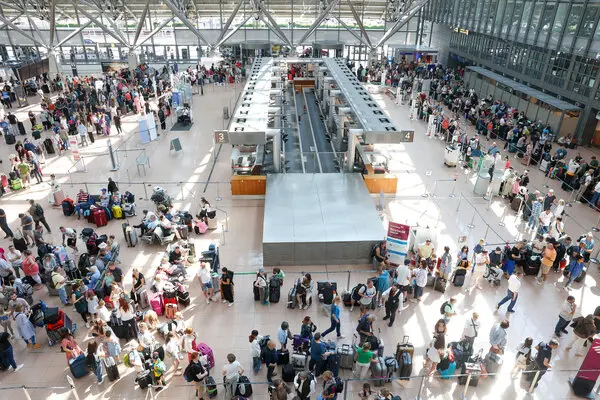A major global computer failure has wreaked havoc in various sectors around the world, causing major disruptions to airline operations, banking services and even emergency response systems. The fallout from this technical problem was felt on every continent, with significant impacts in the USA, Europe, Asia and other regions.
Critical services affected
The most alarming disruption concerns 911 emergency services, which are out of service in several US states, posing a serious risk to public safety. Major U.S. airlines, including Delta, United and American Airlines, saw their flights grounded, leading to major delays and cancellations. The knock-on effect of these outages was also seen in Europe and Asia, where airlines faced similar disruptions.
In Massachusetts, several airlines cancelled their flights, adding to the chaos at airports. Massachusetts General Hospital, the state’s largest hospital, also canceled elective surgeries. Other hospitals in the state reported significant impacts on their operations due to the disruptions. Banks in Australia, New Zealand, South Africa and Great Britain reported problems, as did health services in Israel, Germany and the UK. The scale of these outages highlights the global dependence on interconnected technological systems and the potential vulnerabilities they present.
Root cause and response
The outages appear to be linked to a software update for Microsoft Windows operating systems released by cybersecurity firm CrowdStrike. According to several experts, this update caused widespread disruptions. CrowdStrike’s CEO announced that a patch had been deployed, and Microsoft confirmed that the “underlying cause” had been resolved. However, the effects of the outages persist and are affecting various services, CNN reported, interviewing some IT experts.
The US Department of Homeland Security issued a statement on X, saying it is “working with CrowdStrike, Microsoft and our federal, state, local and critical infrastructure partners to fully assess and remediate system outages”.
Impact on US airports
The computer failure has particularly disrupted flight operations at major US airports. Here’s what some airports are communicating to their customers, according to an article published on CNN.com:
Hartsfield-Jackson Atlanta International Airport: Despite current difficulties, airside operations are up and running. Andrew Gobeil, public affairs manager at the airport, urged passengers to remain patient, acknowledging the discomfort caused by the situation. “It’s Atlanta, it’s summer. It’s hot, it’s humid. People are a little nervous,” said Gobeil. “You have to be patient. We try to be gracious and patient with all passengers.”
Dallas Fort Worth International Airport: The airport warned of significant delays and cancellations throughout the day due to global technology issues. “We ask our customers to check their flight status with their airline before coming to the airport. Longer queues are possible, so allow extra time,” the airport advised.
Chicago O’Hare International Airport: Passengers were advised to check the status of their flight directly with their airline due to technical problems, and to expect longer queues and waiting times.
John F. Kennedy International Airport: The airport reported that the Port Authority was not affected by the global network outage, but that some airlines were experiencing delays and cancellations. “Do not proceed to the airport until the status of your flight is confirmed,” the airport warned.
Charlotte Douglas International Airport: The airport advised passengers not to go to the airport if they have not confirmed their flight with the airline.
Miami International Airport: Authorities noted that U.S. Customs and Border Patrol operations were affected nationwide, resulting in a slowdown in the processing of international passenger arrivals.
Ongoing assessment and mitigation
Efforts to understand and mitigate the impact of the outages continue. Collaboration between government agencies and private companies such as CrowdStrike and Microsoft underlines the critical nature of maintaining robust cybersecurity measures.
As the situation evolves, the relevant sectors and departments are working diligently to restore normal operations. In the meantime, the public is urged to remain informed and patient as efforts continue to address and resolve these unprecedented disruptions.
For the time being, the theory of a cyber attack has been ruled out, according to US government authorities.







